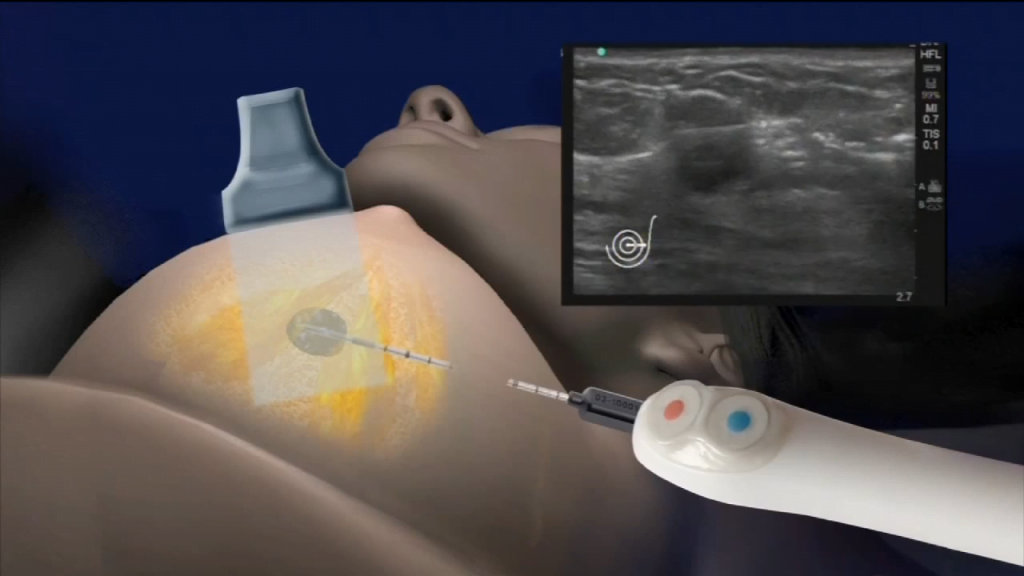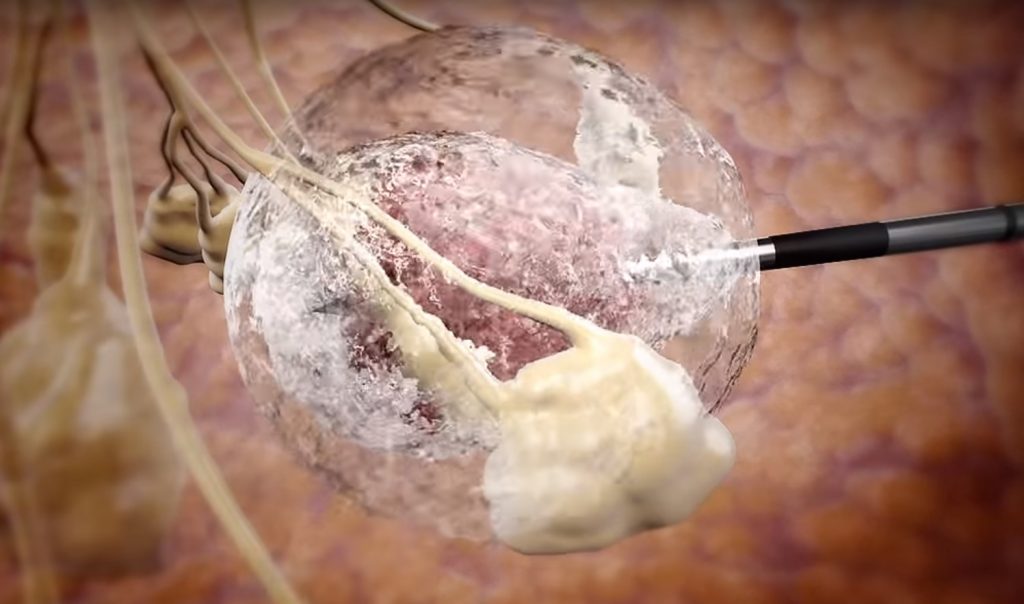Treating cancer is often a notoriously long and trying process, sometimes requiring a combination of surgery and radiation or chemotherapy. These treatments can go on for months or longer, and come with a number of devastating side effects.
Cancer researchers and medical technology companies over these past decades have worked to find forms of treatment that are less invasive but equally impactful. One Israeli biomedical company has envisioned a world where all it would take is a short doctor’s visit.
Since 2006, Caesarea-based IceCure Medical has advanced the concept of cryoablation, a process which uses extreme cold to freeze and destroy diseased tissue used by medical experts for years, to develop technology that would freeze cancer tumors. In 2012, using the company’s IceSense3 system, doctors treated benign breast cancer tumors in four patients during a clinical trial conducted in Kamogowa, Japan. The system had specifically been developed to treat fibroadenomas, which are the most common type of benign breast tumors, typically seen in young women aged 15 to 30.
This is how it works: After administering local anesthesia, a doctor pumps liquid nitrogen at -274F (-170C) through a needle guided by ultrasound scanning to freeze the tumor without affecting surrounding tissue. The whole procedure takes about 15 minutes, can be done in a doctor’s office, and is virtually painless and minimally invasive enough that it does not affect a patient’s daily life. IceCure says it can use its system to treat tumors the size of golf balls. Besides tackling cancer cells directly, cryoablation also stimulates the cells to attack the frozen area, “teaching” the immune to recognize cancer cells, the company says.
SEE ALSO: Israeli Company That Turns Tumors Into Ice Balls Now Sets Its Sight On Lung Cancer
IceCure CEO Eyal Shamir tells NoCamels that IceSense3 has focused mainly on benign and malignant breast tumors, but has also been working on applying the treatment to lung, kidney, liver, and bone tumors. In 2013, the company announced successful clinical trials on patients with malignant lung tumors in Japan. Shamir says that IceCure is currently working on an application for prostate cancer.
The IceCure System
“In Western countries, you have more and more cases of early stage, small, solid tumors…and everyone in the market is looking for a minimally invasive solution,” Shamir tells NoCamels. In an age of increased awareness, advances in medical screenings leading to early detection and intervention, invasive surgery remains the prevailing method of treating cancer, he notes.
Shamir explains that other existing treatments of tumors, like thermoablation – the heating of a tumor with radio waves or other means – can be painful, and that surgery and radiation can “kill patients” with their lasting side effects. IceCure, he says, provides the answer, as a minimally invasive solution that does not leave permanent damage. Neither does it necessitate the physical removal of a tumor from the body, as the body absorbs the dead cells over time.
Sign up for our free weekly newsletter
Subscribe“IceCure did not invent the cryoablation method, which has been known for over twenty years, but it is the most advanced product [of its kind] on the market,” Shamir continues. While other freezing technologies can reach temperatures as low as IceCure, they do so much more slowly and many cannot keep a stable freezing temperature, Shamir explains. IceCure not only reaches freezing temperatures four times faster, but can also keep a colder stable temperature for at least forty times longer, he says.
“Our use of liquid nitrogen allows us to freeze much deeper, much faster, and much cheaper,” says Shamir. A 2017 study by the American Cancer Society found that the total cost of cancer in the US was about $88 billion in direct medical expenditures. Simplifying treatment to a short doctor’s visit would greatly help to reduce costs, IceCure says.
IceSense3 has FDA and CE approval as well as approval from various other local standards, including Hong Kong, Singapore, Thailand, and Mexico.
IceCure’s end users include mostly surgeons, and the company has an office in Collierville, Tennessee that works directly with doctors in the US. The company works through local distributors in other countries.

IceCure. Screenshot via Youtube
Its biggest customers says Shamir, are the US and Japan and it is working to expand in the European and East Asian markets. IceCure often works with trade representatives and chambers of commerce to get acquainted with foreign markets, he says.
IceCure’s History
Founded in 2006, IceCure was part of an incubator hosted by the Israel Innovation Authority (then the Israel Chief Scientist Office) to find a minimally invasive alternative to treat cancer. It became a private company in 2008 before going public in 2011. During most of its years in operation, IceCure focused on research and development and its sales aspect is still in its early stages. Shamir became CEO in 2016, following the departure of previous CEO Hezi Himelfarb, who is now general manager and COO at robotic medical technology company Microbot Medical.
SEE ALSO: New Device Destroys Breast Tumors With Extreme Cold
As of 2011, IceCure is a publically traded company on the Tel Aviv stock exchange, with a market cap of almost NIS 31.5 million ($9.5 million). A majority of its shares (70 percent) are owned by Chinese investor Haixiang Lee, founder and managing partner at VI Ventures.
Related posts

Editors’ & Readers’ Choice: 10 Favorite NoCamels Articles

Forward Facing: What Does The Future Hold For Israeli High-Tech?

Impact Innovation: Israeli Startups That Could Shape Our Future





Facebook comments